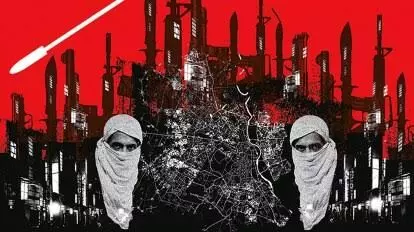How Delhi Became A Fear Capital Under BJP's Watch
A City in Fear: How Rising Crime is Destroying Delhi's Peace;

Delhi, the capital of India, is often hailed as a symbol of the nation’s progress and governance. However, in recent months, it has increasingly earned a more dubious title: the Fear Capital. The alarming rise in crime, particularly extortion, shootings, and gang-related violence, paints a grim picture of law and order in the city. The responsibility for maintaining this order lies squarely with the central government, led by the Bharatiya Janata Party (BJP), through the Union Home Ministry and the Lieutenant Governor (LG). Yet, their failure to address these escalating issues raises serious questions about their competence and commitment to public safety.
Recent statistics reveal a shocking increase in criminal activities across Delhi. Reports indicate that dacoities have surged by 23%, burglaries by 25.2%, and extortion cases have reached 144 this year alone. The number of murders stands at 308, with attempted murders rising by 18% compared to last year. The situation is exacerbated by frequent reports of open shootings and brazen extortion attempts that leave citizens feeling vulnerable and unsafe.
Business owners are particularly affected, with approximately 160 extortion calls reported over just a few months, averaging one call every other day. Many of these calls originate from foreign-based gangsters who operate with impunity, threatening traders and demanding exorbitant sums of money. This environment of fear is reminiscent of the underworld dominance seen in Mumbai during the 1990s.
The BJP-led central government has been criticized for its ineffective handling of Delhi's law and order situation. The recent amendments to the Government of National Capital Territory of Delhi Act have further complicated matters. By consolidating power in the hands of the LG—who acts on behalf of the central government—the elected Delhi government has been rendered nearly toothless. This legislative maneuvering has stripped local officials of their ability to respond effectively to crime, creating a bureaucratic bottleneck that hinders timely action against criminal activities.
The elected government of Delhi, has vocally criticized this power dynamic, asserting that if the BJP cannot manage law and order effectively, it should transfer these responsibilities back to the elected government. His concerns echo those of many residents who feel abandoned by a system that prioritizes political control over public safety.
The rise in crime can be directly linked to the growing influence of organized crime syndicates within Delhi. Gangs such as those led by Lawrence Bishnoi and Deepak Boxer operate openly, instilling fear among citizens and business owners alike. The police's inability to curb these gangs is indicative of a broader systemic failure; rather than being seen as protectors, law enforcement agencies are viewed with skepticism by those they are meant to serve.
The current state of affairs suggests that gangsters are not only thriving but are also emboldened by governmental inaction. Reports indicate that these gangs have become increasingly sophisticated in their operations, utilizing technology such as Voice Over Internet Protocol (VOIP) to conduct extortion calls without fear of immediate repercussions.
Public sentiment is shifting towards a demand for accountability from the central government. Citizens are increasingly vocal about their dissatisfaction with the BJP's handling of security issues. There is a growing consensus that effective governance requires not just authority but also responsibility—a notion that seems lost on those currently in power.
Residents are calling for increased police presence, community engagement initiatives, and stricter enforcement measures to combat crime. They argue that without these changes, Delhi risks becoming ungovernable—a city where fear overshadows freedom.
As Delhi grapples with its identity as a Fear Capital, it is imperative for the BJP-led central government to reassess its approach to law and order. The ongoing rise in crime rates reflects not just a failure in governance but also a betrayal of public trust. If the BJP wishes to maintain its credibility as a governing body capable of managing not just Delhi but all of India, it must take decisive action to restore safety and security in the capital.
This includes empowering local authorities rather than undermining them through legislative overreach. Only then can Delhi hope to reclaim its status as a vibrant capital city—one where citizens feel safe and secure rather than fearful and oppressed. The time for accountability is now; anything less would be an abdication of responsibility by those who claim to lead.

